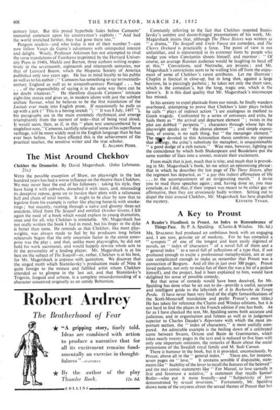The Mist Around Chekhov
WITH the possible exception of Shaw, no playwright in the last hundred years has had a worse influence on the theatre than Chekhov. We may never hear the end of his followers : taking his style, they have hung it with cobwebs, drenched it with tears, and, misreading its deceptive repose, gone on to burden their plots with a talismanic ball and chain of total inertia. It ought to be clear by now that to legislate from his example is rather like playing hoop-la with smoke- rings but recently, rustling through a naive and gloomy three-act anecdote, lifted from The Seagull and entitled October Grotto, I felt again the need of a book which would explain to young dramatists, once and for all, why Chekhov is inimitable. Mr. Magarshack has not really written the book I had in mind, but his finger in the dyke is better than none. He reminds us that Chekhov, like most play- wrights, was always made to feel by his producers long before rehearsals began that the only uncertain factor in the entire enter- prise was the play ; and that, unlike most playwrights, he did not hold his work sacrosanct, and would happily rewrite whole acts to fit the personality of a leading player. Mr. Magarshack is at his best on the subject of The Seagull—or, rather, Chekhov is at his best, for Mr. Magershack is copious with quotation. We discover that the singed moth which Stanislavsky's production made of Nina is quite foreign to the mature and fulfilled artist whom Chekhov intended us to glimpse in the last act, and that Stanislavky's Trigorin, languid and urbane, is a complete misunderstanding of a character conceived originally as an untidy Bohemian. Constantly referring to the fact that Chekhov resented Stanis- lavsky's sombre and doom-fringed presentations of his work, Mr. Magarshack insists that, although The Three Sisters was written as "a drama," The Seagull and Uncle Vanya are comedies, and The Cherry Orchard is practically a farce. The point of view is not unfamiliar, and is represented in its extremer form by people who nudge you when Constantin shoots himself, and murmur : " Of course, an average Russian audience would be laughing its head off at this." Convictions, said • Nietzsche, are prisons ; and Mr. Magarshack 's convictions seem to be walling him off from the enjoy- ment of some of Chekhov's rarest attributes. Let me illustrate : Chaplin is farcical in close-up, but in long shot, against a large horizon, he is piercingly pathetic ; he takes not only the short view, which is the comedian's, but the long, tragic one, which is the clown's. It is this dual quality that Mr. Magarshack's microscope has missed.
In his anxiety to expel platitude from our minds, he finally wanders overboard, attempting to prove that Chekhov's later plays (which he calls " plays of indirect action ") are analogous in method to Greek tragedy. Confronted by a series of entrances and exits, he hails them as " the arrival and departure element " ; twists in the plot are dubbed " peripetia " ; characters through whose lips the playwright speaks are " the chorus element " ; and simple exposi- tion, of course, is no such thing, but " the messenger element." The swop devoted to this Aristotelian thesis confirms my opinion that Aflogy, the critic's substitute for metaphor, is unquestionably " a good dodge of a rich nature." Wise men, however, lighting on the coincidence by which both Shakespeare and Baudelaire put the same number of lines into a sonnet, restrain their excitement.
From mulch that is just, much that is trite, and much that is provok- ing in Mr. Magarshack 's book, let me select an epitomising phrase : that in which he describes the last page of The Three Sisters, after the regiment has departed, as " a gay (his italics) affirmation of life . .. to. the accompaniment of an invigorating march." I invite you to read those speeches again ; and, having done so, you may conclude, as I did, that, if their impact was meant to be either gay or affirmative, then they are atrociously badly written. Setting out to dispel the mist around Chekhov, Mr. Magarshack has here dispelled


































 Previous page
Previous page